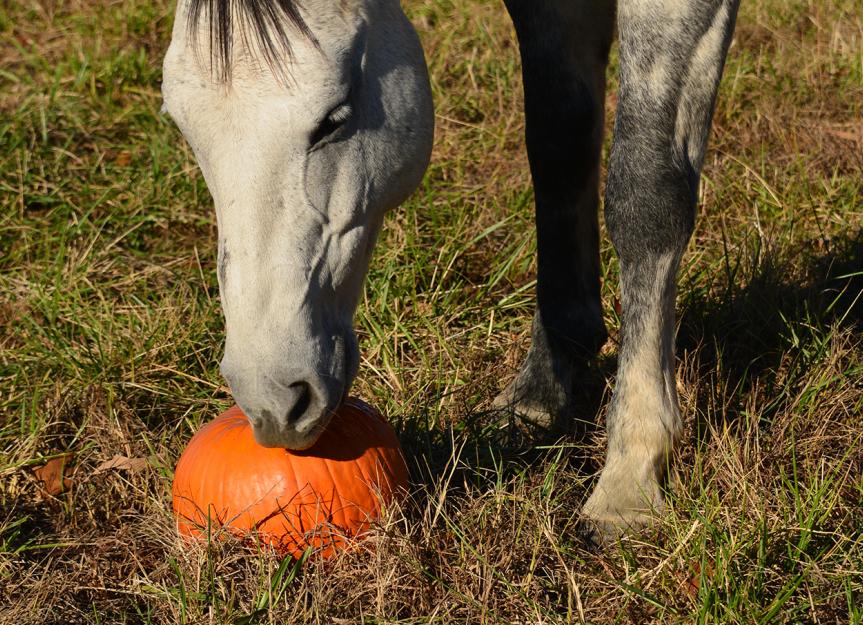
NOTE: Always check with your veterinarian before giving your horse any new foods, especially people food. What might be OK for one horse might not be good for your horse, depending on multiple factors such as their age, health history, health conditions, and diet.
If you’re a fan of pumpkin-spiced lattes and pumpkin muffins, you might wonder, can horses have pumpkin too? Yes, they can—in moderation, of course.
“Orange pumpkins are safe, including the skin, the seeds, and the filling inside,” says Emma Kerr, DVM, an equine veterinarian intern at Vermont Large Animal Clinic in Milton, Vermont. “They should not have gourds or squashes.”
Like any other treat, pumpkins should supplement a horse’s diet, rather than replacing any part of the horse’s hay or concentrate ration. It should also not be used as a substitute for any medications. Feeding a well-balanced diet is necessary to keep your horse healthy.
Key Takeaways
- Plain raw, cooked, and 100% pure canned pumpkin (with no added ingredients) is a good treat, especially for horses with equine metabolic syndrome and polysaccharide storage myopathy.
- Pumpkin is high in potassium and should not be fed to horses with hyperkalemic periodic paralysis; excess potassium is not recommended for horses with this genetic condition.
- Avoid feeding horses pumpkin pie filling, seasoned pumpkin, or moldy pumpkins to avoid digestive issues and toxic ingredients.
Is Pumpkin Good for Horses?
There are few studies on the health benefits of feeding pumpkin to horses, but pumpkin has generally been proven to include key nutrients that support digestion and overall cellular and immune health. These essential nutrients include:
Pumpkin seeds also contain nitric oxide, which in human research has been shown to play important roles in promoting healthy blood flow, memory, pancreas function, and the sense of smell.
Can Pumpkin Be Bad for Horses?
Pumpkin is generally good for horses to eat, including horses with metabolic issues.
Even though pumpkin has a high glycemic index, the sugar absorbs into the bloodstream slowly, making it safer than other treats for horses who are prone to laminitis, says Dr. Kerr.
However, pumpkins contain potassium, which is problematic for horses with HYPP who must have low-potassium diets.
How Much Pumpkin Can My Horse Eat?
Treats of any kind should be fed in moderation. A horse’s diet should be designed around forage first (hay and grass), feed, and supplements based on the individual horse’s needs, and treats as just that—a treat.
Fruits, including pumpkins, should be fed in moderation, making up no more than 1% of your horse’s daily diet. The rest should come from a well-balanced diet based on recommendations from your veterinarian and/or an equine nutritionist.
Safe Pumpkin Serving Size for Horses
Pumpkin should be introduced slowly and given to horses in limited amounts. “For metabolic horses, keep servings on the lower end of things,” Dr. Kerr says.
Below is a general guide for serving sizes, but your veterinarian can recommend specific amounts for your horse.
| Small (under 600 pounds) | ½ cup | 1 teaspoon | Once a day |
| Average (600–1,100 pounds) | 1 cup | 2 teaspoons | Once a day |
| Large (1,100+ pounds) | 1½ cup | 1 tablespoon | Once a day |
How To Safely Feed Pumpkin to Horses
Before feeding your horse pumpkin, it’s important to prepare it properly. Raw pumpkin can be a choking hazard.
“Horses that are choking may have a nasal discharge coming from their nostrils or have salivation around their mouth,” says Dr. Kerr. “If they look like they’re in distress and have any of these symptoms, that’s an emergency and you need to call your veterinarian.”
To prepare raw pumpkin:
Dr. Kerr says that adding pumpkin pieces to hanging horse toys, like the PetKORE Luna Ring, in stalls or turnout sheds can make a treat into an enrichment experience to beat boredom.
To prepare cooked pumpkin:
You can skip the hassle of cooking pumpkin and opt for canned instead. Always read the label to ensure it is not pumpkin pie mix and that it contains no additives.
What To Do If Your Horse Eats Too Much Pumpkin
Whenever you feed something new, watch your horse for signs of discomfort. The same is true if your horse overindulges in pumpkin. If you suspect your horse has eaten too much pumpkin, observe them for a few days.
Call your veterinarian right away if your horse shows the following signs of colic:
While most healthy horses can eat pumpkin without issue, every horse is an individual. Senior horses, those with dental problems, or those with certain health conditions may need to avoid it altogether.
Ask your veterinarian or an equine nutritionist if you’re concerned about feeding pumpkin to your horse.
Can Horses Eat Pumpkin FAQs
Can foals eat pumpkin?
No, foals should not eat pumpkin until they have a full set of teeth.
Is raw or cooked pumpkin better for horses?
Both raw and cooked pumpkin are good for horses, although the serving size varies.
Can horses eat pumpkin seeds?
Yes, horses can eat pumpkin seeds.
Can horses eat pumpkin guts?
Yes, horses can eat pumpkin guts.
Can horses eat pumpkin pie?
No, horses should not eat pumpkin pie, which typically includes ingredients unsafe for horses.
Can horses eat canned pumpkin?
Horses can eat 100% canned pure pumpkin, but they should not be fed canned pumpkin pie mix or canned pumpkin with additives like salt or sugar.



